
Clinical Pearls and Future of Bladder Cancer Treatment
Eric A. Singer, MD, MA, FACS, looks to the future of bladder cancer treatment and offers advice for community urologists and urologic oncologists treating patients with the disease.
Transcript:
Eric A. Singer, MD, MA, FACS: I think immunotherapy is only going to continue to grow in terms of how we’re using it. Are we going to use it as monotherapy, as one drug, or in combination? I think that’s a great question. We’re certainly seeing a lot of escalation of therapy across different GU [genitourinary] malignancies, whether that’s prostate, kidney, or bladder. We’re combining more and more drugs to hit cancer through multiple pathways at the same time. The combination of using intravesical chemotherapy as well as systemic immunotherapy makes a lot of sense. We have novel delivery systems in terms of how to give that medicine inside the bladder for longer periods of time with different biopolymers that have been developed. We recently reported some really interesting results.
I would say we’re going to continue to look at combining things, and then our challenge is going to be to figure out how to best balance the clinical toxicity as well as the financial toxicity to ultimately figure out which patients need combination therapy the most. Who are the people who would be better served with monotherapy? Then the duration of therapy, how long are we going to keep exposing patients to this?
[These are] exciting times. A lot of important work needs to be done in our predictive biomarkers, not only in terms of predicting response to treatment or resistance to treatment, but also predicting who is going to get what type of adverse event. If for some reason someone was very prone to getting an adverse effect related to the intravesical chemotherapy, then perhaps we would want to do a monotherapy with just the immunotherapy, and vice versa. If someone is at high risk for getting a toxicity from the immunotherapy, then maybe we want to think about doing a combination intravesical chemotherapy. So again, we’re going to need to figure out how to best balance our approach now that we have more and more options.
The use and timing [of therapy] is a bit different. For non-muscle-invasive bladder cancer, right now we have pembrolizumab approved. There are studies going on looking at combination therapies for patients with muscle invasive bladder cancer who are trying to spare their bladder. So [deciding] whether to use intravesical chemotherapy plus immunotherapy plus radiation as a way to try to avoid radical cystectomy. We now have evidence showing benefit from adjuvant immunotherapy after radical cystectomy. There was even a recent paper published showing the importance of dose-dense MVAC [methotrexate, vinblastine, doxorubicin, and cisplatin], using 4 different drugs prior to radical cystectomy as neoadjuvant treatment for muscle-invasive bladder cancer.
A lot of this is going to be influenced by the biology of the patient. If someone has significant renal insufficiency or peripheral neuropathy or hearing problems, that means they may not be the best person to get a platinum-based chemotherapy. So we would need to think about using other things in its place. Again, many patients with muscle-invasive bladder cancer are older and have comorbidities. We need to look at their comorbidities, look at their risk of toxicity, and look at the likely efficacy of each treatment and try to find the most effective, least toxic, most tolerated treatment and put that together as part of a multidisciplinary team to help a patient achieve his or her goals.
I think one of the most important things we can do is keep in mind referring to clinical trials. This is where we advance the field. This is how we’re able to offer patients the best we have to give them. I would always keep in mind talking about clinical trials, and referring to centers that are running clinical trials, so patients are able to choose from not only the standard of care but also some investigational options, especially for patients with difficult to treat conditions such as high-grade non-muscle-invasive bladder cancer that is recurrent and has come back after previous treatments.
There are some great organizations out there such as BCAN, the Bladder Cancer Advocacy Network. [They have] outstanding resources on their website as well as support groups and patient advocacy. ASCO, the American Society of Clinical Oncology, has fantastic content, as well as the American Urological Association. So again, I encourage patients to get a second opinion. As I tell them, if I was going to go buy a new dishwasher, I’d check at more than one store. If you’re thinking about having major surgery, talk to a couple of people, find someone you’re very comfortable working with, find someone who does it a lot at a place that does it a lot, and seek your care with them.
Transcript edited for clarity.
Newsletter
Stay current with the latest urology news and practice-changing insights — sign up now for the essential updates every urologist needs.







